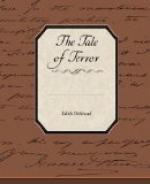Lewis was educated at Westminster and Christ Church, but a year spent in Weimar (1792-3), where he zealously studied German, and incidentally, met Goethe, seems to have left more obvious marks on his literary career. To Lewis, Goethe is pre-eminently the author of The Sorrows of Werther; and Schiller, he remarks casually, “has, written several other plays besides The Robbers."[41] He probably read Heinse’s Ardinghello(1787), Tieck’s Abdallah (1792-3), and William Lovell (1794-6), many of the innumerable dramas of Kotzebue, the romances of Weit Weber, and other specimens of what Carlyle describes as “the bowl and dagger department,” where
“Black Forests and Lubberland, sensuality and horror, the spectre nun and the charmed moonshine, shall not be wanting. Boisterous outlaws also, with huge whiskers, and the most cat o’ mountain aspect; tear-stained sentimentalists, the grimmest man-eaters, ghosts and the like suspicious characters will be found in abundance."[42]
Throughout his life he seems to have made a hobby of the literature that arouses violent emotion and mental excitement, or lacerates the nerves, or shocks and startles. The lifelike and the natural are not powerful enough for his taste, though some of his Romantic Tales(1808), such as My Uncle’s Garret Window, are uncommonly tame. Like the painter of a hoarding who must at all costs arrest attention, he magnifies, exaggerates and distorts. Once when rebuked for introducing black guards into a country where they did not exist, he is said to have declared that he would have made them sky-blue if he thought they would produce any more effect.[43] Referring to The Monk, he confesses: “Unluckily, in working it up, I thought that the stronger my colours, the more effect would my picture produce."[44]
One of his early attempts at fiction was a romance which he later converted into his popular drama, The Castle Spectre. This play was staged in 1798, and was reconverted by Miss Sarah Wilkinson in 1820 into a romance. Lewis spreads his banquet with a lavish hand, and crudities and absurdities abound, but he has a knack of choosing situations well adapted for stage effect. The play, aptly described by Coleridge as a “peccant thing of Noise, Froth and Impermanence,"[45] would offer a happy hunting ground to those who delight in the pursuit of “parallel passages.” At the age of twenty, during his residence at the Hague as attache to the British embassy, in the summer of 1794, he composed in ten weeks, his notorious romance, The Monk. On its publication in 1795 it was attacked on the grounds of profanity and indecency.




